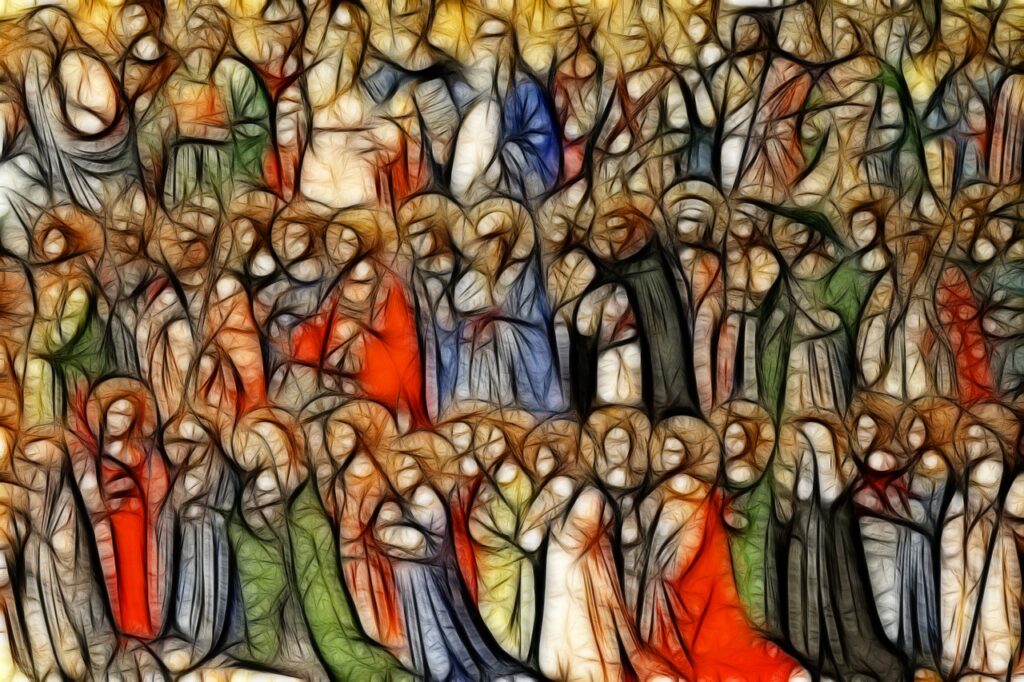Today, the 1st of November, All Saints’ Day is celebrated in many countries. The Christian Church celebrates, other than all of their saints, a solemn feast for all the deceased, who, having passed through purgatory, have been totally sanctified, have obtained the beatific vision and enjoy eternal life in the presence of God.
The initiator of the measure was Pope Gregory III, who during his time as pontiff (731-741) consecrated a chapel in St. Peter's Basilica in honour of all the saints. In this way, all the saints were to be venerated at least one day a year, and up to this day. This holiday might involve family and friends gathering to pay respects and to remember those who have died.
Death is central to religion. Faith-based religion would not exist without death. How could you talk about eternal life if death did not exist? On the other side of the spectrum, atheism would say that nothing happens to you after death, therefore there is nothing to worry or fear. Nevertheless, this article does not aim to revise religious or non-religious views about life and ‘after-life’, but to give a more positive view of death.
I think it is fair to claim that everyone has feared death at some moment in their lives. Many have been close to it or have had someone close dying. In any case, death can seem like this irreversible cessation of life that darkens our existence, that turns down the volume of life and that takes away any meaning to whatever we do with our lives.
What would be the point of working until late, of waking up early, of treating other people politely if one day we won’t be here? Nihilists would go even further, with a vision of life where we don’t believe in anything, where life is empty of meaning.
Death has to be one of the most complex understandings and unresolved matters in the history of human life. Some might say it’s scary. Some might say it’s liberating. Some might say they don’t think about it, others might be constantly anxious about the mere thought of death. And even if we try to keep it far away from us, we are constantly bombarded by news about someone being dead in the other part of the globe. And yet, it feels so unfamiliar, it feels like a taboo topic in society, something we shouldn’t reflect on.
I believe the problem is our framing of death. How can death be bearable if we can’t stop imagining waking up in an unknown utterly dark room for eternity? But I think we shouldn’t think of ourselves as dead because we can’t be dead. What do I mean by this?
Dropping the self
We have all daydreamed about situations we like, and situations we dislike. Being lost in thought has the potential to dye our mood. We keep thinking of ourselves in different situations, throwing us into places that are not reality.
It is easy to think that we are subject to our experience. That we are experiencers of experience, that we are an ego. Language is misleading and contributes to this idea. We use pronouns to describe our identity, and possessive adjectives to own things. We feel like ‘we’ have arms and legs. Language is used in a way that makes us think that we are a passenger inside a head controlling the rest of the body. It might be practical, and it probably makes our lives easier in many ways, but it comes with some costs too. Think about what people would say if you describe your parts of the body as what you are. ‘I am arms’, ‘I am legs’, instead of ‘I have arms’ or ‘I have legs’. How strange that would be?
Thinking that we are a passenger inside our bodies is nothing but an illusion. There is no alien commanding the body - like the autopsy in Men in Black made us think. It is true that the internal experience - what it feels to be us - is as real as it feels. And this should not be taken for granted. But that does not mean it is separated from biology, that is floating somewhere else away from our body. Whatever the soul might be, or whatever we think it is, it is certainly part of the experience, like everything else.
Meditation has been a common practice for thousands of years to lose this feeling, to stop seeing experience from one side and just becoming identical to experience, to go through an ego-transcend experience. This might not be a revealing claim about the universe, yet it talks so much about the nature of experience and the possibilities of living in a different way. But how can this help us deal with death?
If we manage to drop the idea of self, to feel identical to the experience instead of being witnesses of experience, then death has no space. If death is the absence of experience, and we are identical to experience, then death means nothing to us. Quoting Epicurus, ‘when we exist, death is not; and when death exists, we are not’. Fear of death can only arise from the belief that in death there is awareness, but death is absence.
An example would be to think about all the decades and centuries previous to our birth. Are we nostalgic about those times? Do we have memories from those years? The absence of experience is the absence of everything we are, therefore, death occupies the same space as prior birth. In a satisfactory way, we are immortals. Because if we are experience, then as long as there is experience, we will always be. And if there is no experience, we can’t be, which means we will always be experience.
Reframing the notion of death should help us live a better life. It serves as a tool, as a catalyser, and as a powerful message that increases the rate of energy. The death of our loved ones, our finitude and other people’s death plays an important role in life.
Grieving and mourning are necessary. But I think it is essential not to find consolation in spooky ideas and claims about the after death, and to instead deal with the fact of what death really is, and to be more aware of it on a daily basis to be conscious about how we spend our time, knowing that there are not that many days in life.
The answer, after all, to a better life, is to be more present. Is to feel identical to experience, and to understand that any thought from the past or the future inevitably arises in the present moment, and this will not change. The only way to enjoy it is to anchor ourselves to experiencing the present moment, not hoping for a better moment to come or to revive a moment from the past.


